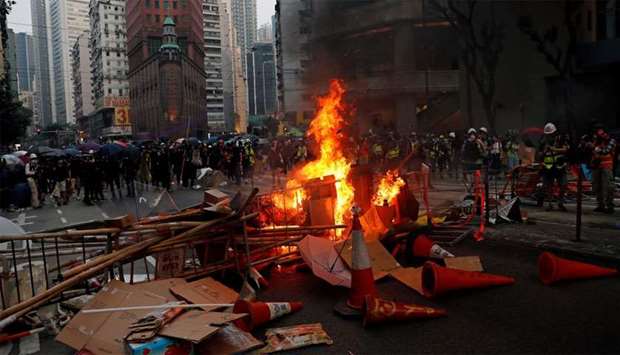Hong Kong police arrested dozens at a mass rally on Sunday, using water cannon, tear gas and pepper spray against protesters.
Protesters attempted to disperse and avoid police squadrons, but with subway stations closed they had to change out of their signature black t-shirts, flag down volunteer drivers or even attempt to cross the mountainous centre of Hong Kong Island.
Clashes occurred earlier than usual on Sunday after thousands marched peacefully through Hong Kong Island before gathering in front of government headquarters, where they threw bricks and petrol bombs over a barrier at riot police.
‘We are all aware we could get arrested, we try our best to not get caught, but we still have to stand up because Hong Kong is our home,’ one protester named Leonard told dpa as he helped assemble a barricade of umbrellas.
Police later fired a water cannon with blue abrasive dye from behind the barrier. Tactical police swept in and made dozens of arrests, battering some protesters into submission.
More mass arrests took place near Hong Kong's High Court, where police pinned protesters to the ground with several appearing to be severely injured.
Nonetheless protesters refused to disperse, as they did at a similar demonstration on Saturday.
Smaller skirmishes occurred across Hong Kong Island. In one, an undercover police officer fired a shot into the air after protesters threw bricks at a group of undercover officers, according to the South China Morning Post.
A student named Cyrus told dpa that protesters were determined to stay out as Sunday's march was against ‘totalitarianism’ in the Hong Kong and Beijing governments.
‘We as Hong Kongers we need to stand up to tell the world that we are not afraid or threatened by the 'Chinanazis' or totalitarianism,’ he said.
The term ‘Chinanazi’ has become widely used at protests recently, drawing comparisons between the Chinese Communist Party and Germany's Nazi dictatorship.
Anger at China and the Communist Party and its perceived interference in Hong Kong affairs is just one sign of how the protest movement has changed since it began in June.
Initially, people protested against a legislative bill that would have allowed for residents to stand trial in mainland China, but they appeared to have unleashed widespread anger simmering below the surface.
They quickly escalated into a far greater political crisis as the government failed to meet protest demands as hundreds of thousands peacefully marched in the streets.
Police violence and arrests have become another key concern, and one reason protests continue even after Hong Kong's Chief Executive Carrie Lam formally withdrew the extradition bill this month.
Protesters say they will continue until all of their demands, including democratic reform and an independent investigation of police conduct, are met.
Many question whether the local government or Beijing is in charge of the former British colony even as it was promised semi-autonomy until 2047.
The movement is ‘not just against the [Chinese Communist Party], it's against the whole government authority,’ said one protester. He said he was marching peacefully with friends to ‘express ourselves while we still have freedom of speech.’ ‘It's not a thing that develops overnight. We are seeing increasing influence from the Chinese government and they are not listening to what the people want. To me it seems they are [tyrannical].’

